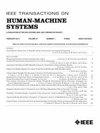利用基于 QR 分解的近似 SVD 从损坏的三维运动捕捉数据中快速高效地恢复人体动作
IF 3.5
3区 计算机科学
Q2 COMPUTER SCIENCE, ARTIFICIAL INTELLIGENCE
引用次数: 0
摘要
在本文中,我们提出了一种鲁棒算法,用于从损坏的三维动作捕捉(mocap)序列中快速恢复人的动作。所提出的算法可以同时处理 mocap 数据中的错误表示和不完整表示。通过最大限度地减少与时间和资源利用相关的开销,确保了所提算法的快速收敛。为此,我们使用了基于 QR 分解和 $\ell _{2,1}$ 准则最小化的近似奇异值分解(SVD)来替代传统的基于核准则的 SVD。此外,我们还在优化问题中加入了人类行动的时空特性。为此,我们在问题表述中引入了成对分层约束和轨迹移动约束。最后,所提出的方法无需庞大的数据库来训练模型。该算法可轻松适用于任何形式的损坏 mocap 序列。与采用同类约束条件的同行相比,所提出的算法平均快 30%,恢复性能也有所提高。本文章由计算机程序翻译,如有差异,请以英文原文为准。
A Fast and Efficient Approach for Human Action Recovery From Corrupted 3-D Motion Capture Data Using QR Decomposition-Based Approximate SVD
In this article, we propose a robust algorithm for the fast recovery of human actions from corrupted 3-D motion capture (mocap) sequences. The proposed algorithm can deal with misrepresentations and incomplete representations in mocap data simultaneously. Fast convergence of the proposed algorithm is ensured by minimizing the overhead associated with time and resource utilization. To this end, we have used an approximate singular value decomposition (SVD) based on QR decomposition and
$\ell _{2,1}$
求助全文
通过发布文献求助,成功后即可免费获取论文全文。
去求助
来源期刊

IEEE Transactions on Human-Machine Systems
COMPUTER SCIENCE, ARTIFICIAL INTELLIGENCE-COMPUTER SCIENCE, CYBERNETICS
CiteScore
7.10
自引率
11.10%
发文量
136
期刊介绍:
The scope of the IEEE Transactions on Human-Machine Systems includes the fields of human machine systems. It covers human systems and human organizational interactions including cognitive ergonomics, system test and evaluation, and human information processing concerns in systems and organizations.
 求助内容:
求助内容: 应助结果提醒方式:
应助结果提醒方式:


